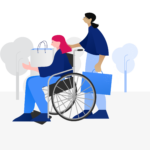
The Future of Shopmobility: A Glimpse into the Next 10 or 20 Years
December 7, 2023
The Journey of Durham City Shopmobility: Empowering Mobility and Independence
December 7, 2023In the UK, societal bias against individuals with disabilities is a significant issue that needs to be addressed. This bias stems from ignorance and misunderstanding, leading to exclusion and discrimination. To overcome this bias, a collective, multifaceted approach is essential.
One of the key steps in addressing bias against disability is implementing and enforcing robust anti-discrimination laws and policies. These laws should aim to enhance accessibility in public spaces, including streets, buildings, and public transport. By ensuring that these spaces are accessible to all individuals, regardless of their disabilities, we can create a more inclusive society. This means providing ramps, elevators, and accessible toilets in public buildings, as well as ensuring that public transport is equipped to accommodate individuals with disabilities.
However, it is not enough to simply have laws in place; they must be effectively enforced. This requires training and education for law enforcement agencies, as well as regular audits to ensure compliance. By holding individuals and organizations accountable for their actions, we can send a strong message that discrimination against individuals with disabilities will not be tolerated.
In addition to legal measures, there is a pressing need for comprehensive awareness and educational programmes. These programmes should be tailored to effectively challenge and dispel prevalent misconceptions and false beliefs about disabilities. By providing accurate information and personal stories, we can help people understand that disability does not define a person’s worth or capabilities.
These awareness and educational programmes should start at a young age, in schools and educational institutions. By teaching children about disabilities and fostering empathy and understanding, we can create a generation that is more accepting and inclusive. This can be achieved through inclusive curricula, guest speakers with disabilities, and interactive activities that promote empathy and understanding.
Furthermore, it is important to involve individuals with disabilities in these programmes. By giving them a platform to share their experiences and perspectives, we can humanize the issue and challenge stereotypes. This can be done through panel discussions, workshops, and media campaigns that highlight the achievements and contributions of individuals with disabilities.
Another crucial aspect of overcoming bias against disability is promoting employment opportunities for individuals with disabilities. Many individuals with disabilities face barriers to employment, which can perpetuate the cycle of exclusion and discrimination. By implementing inclusive hiring practices and providing reasonable accommodations, we can create a more inclusive workforce. This not only benefits individuals with disabilities but also enriches workplaces with diverse perspectives and talents.
Finally, it is important to foster a culture of inclusivity and respect in all aspects of society. This means challenging ableist language and attitudes, promoting accessible and inclusive events and activities, and ensuring that individuals with disabilities have equal access to healthcare, education, and social services.
In conclusion, overcoming bias against disability in the UK requires a collective effort. This involves implementing and enforcing robust anti-discrimination laws and policies, enhancing accessibility in public spaces, raising awareness and dispelling misconceptions through educational programmes, promoting employment opportunities, and fostering a culture of inclusivity and respect. By working together, we can create a more inclusive and empathetic society that values and respects the rights and dignity of all individuals, regardless of their disabilities.


